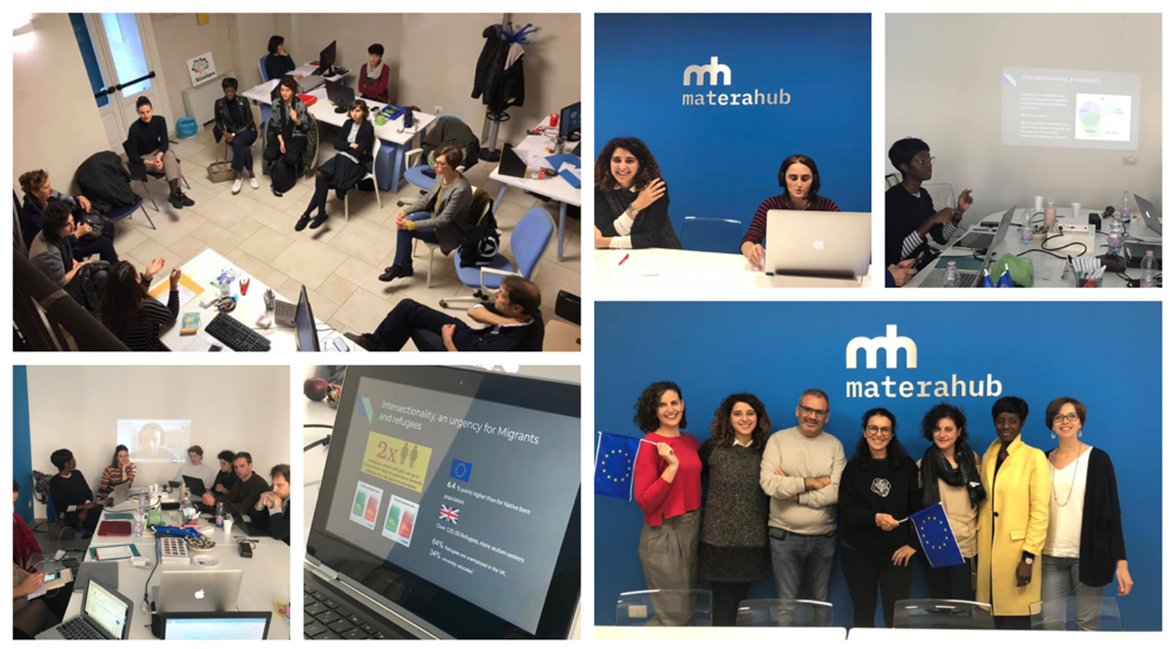3. LA Matera: SDG 5 & 10

Learning Activity within the sociSDG project took place in Matera, November 2018 at the Materahub(Italy).
It was impressive and inspiring to listen to solutions for Gender equality and Reduced inequalities
- Catia Caponero, founder of the Matera women collective presented the association's activities with particular attention to the issue of violence against women, which is one of the objectives to be fought to ensure greater inclusion and integration of women in society. In fact, the data show that from January 1st to October 31st 2018 the female suicides rose to 37.6% of the total homicides committed in our country (they were 34.8% the year before), with a 79.2% of female suicides family members (80.7% in the first ten months of 2017) and 70.2% of couples' feminicides (65.2% in January-October 2017).
- Vanessa Vizziello, President of the RiSvolta di Matera association presented us topics of LGTB and gender equality. Italy is in 118th place in a ranking with 144 countries for participation and economic opportunities, while it is at 46th for political representation. Regarding the work situation, about 62% of Italian women are paid less than men and many of them do not hold managerial and leadership positions. The objective of RisVolta is precisely that of intervening on the various social groups without discrimination of any kind through a greater openness and participation of the community of Matera.
- A study visit was organized at the Social Cooperative Il Sicomorowhich deals with reception and support for migrants and refugees through work orientation, language courses, cultural activities, psychological support and projects to support families and children.
- Indira Kartallozi from Kaleidoscope Futures introduced us to the definition of a terms migration, refugee and modern slavery with related statistics: 65 milion people are forcibly displaced (34.000 people from conflict, 185 million people from natural disasters, 1.5 million people from development projects and 2.8 mission from conflict materials). However, Mrs Kartallozi also provided solutions and values which migration is providing. More value can be provided by risk embracers, niche ideas, serving customer differently, connecting and accessing markets.
- Aris Vrettos, Director at Open and International Programmes at Cambridge Institute for Sustainability Leadership (CISL)introduced us to the topic of Income and Wealth inequality in western socities and the role of business and the changing relationship between the two. From the CISL survey among the CEOs and CFOs, the most important issues about sustainability is climate change and good governance. Eventhough we have a big media about inequalities, still inequalities are not something what people connect with sustainability. Statistic shows that 71% of global population income is less than 10$ what is low income, compared to 7% of global population which income is more than 50$, concluding that more than the 2/3 of global population are below 10$ per day. According the Credit Swiss Report 2017 (Global Wealth report), world's half population, or 3.5 billion poorest adults have assets of less than 10.000$, or 68,7% of world’s working age population account for just 2,7 of global wealth (mostly people living in developing world). However, because of urbanization, data shows that levels of inequality today have not been seen for 200 years, not limiting poverty only to developing world, but also to intracountry inequalities. Climate change and economic degradation with declining resources security at the lower end of the population are the trends which will continue to accelerate and create risks for local communities and entire regions with potential for conflict. Also, the impact of 4thindustrial revolution to employment which needs to be well planned from the governments and other actors on society.
- Ruby Sandhu from Human Rights Solicitor RS Collaboration presented and inspired for a topic of business and its impact on human rights. As globalization happens there will be difficult supply chains who are going into new markets and really taking jurisdictional nuances and not taking western legislative standards with them, what presents the key concern addressing sort of modern slavery social inequality, especially important in public procurement. Mrs. Sandhu suggested a solution for reduced inequality especially considering refuges: awareness-building through appropriate mechanisms and portals such as data technology by presenting a cross-border collaboration as important. This approach is important because our world is interlinked and there are no organizations who operate in bubbles or silos, so it is our common responsibility (especially companies) to better understand political and social situation and context.
- Emily Leonard from The Entrepreneurial Refugee Network (TERN)an organization which integrates refugees effectively into local communities, gave in insight of inequalities through social entrepreneurship. According to Compass report, Oxford 2018 there are around 150.000 refugees in the UK population which is increasing by 10.000 per year (which presents natural historical flow not a crisis), also 24% of refugees are unemployed compared to 5% of general population unemployment, 32% have previously owned a business or worked in the family business. Through TERN entrepreneurial support service, refugees get education and support for entrepreneurial and economic opportunities which has shown as successful model of regugee integration into new community.
During the learning activity, a webinar on the SDG5 and SDG10 have been held and recorded:
- HERE YOU CAN WATCH A RECORDING OF WEBINAR SDG10 Hosted by KaleidoscopeFutures
- Webinar presentation SDG10
Webinar provided information about best practice of SDG5 and SDG10 and their integration in the business models.
PRESENTATIONS:
Gender equality (SDG 5) - Introduction
Reduced inequalities in Slovakia
Reduced inequalities in UK - TERN
Reduced inequalities: Migration - Overblown Crisis and Under looked Opportunities